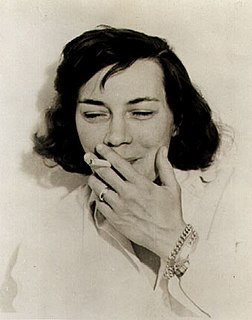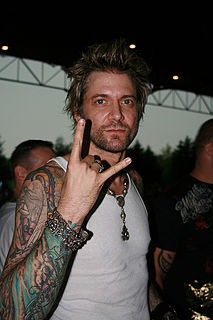A Quote by Diane Ackerman
We tend to think of memories as monuments we once forged and may find intact beneath the weedy growth of years. But, in a real sense, memories are tied to and describe the present. Formed in an idiosyncratic way when they happened, they're also true to the moment of recall, including how you feel, all you've experienced, and new values, passions, and vulnerability. One never steps into the same stream of consciousness twice.
Quote Topics
Also
Beneath
Consciousness
Describe
Experienced
Feel
Find
Forged
Formed
Growth
Happened
How
How You Feel
Including
Intact
May
Memories
Moment
Monuments
Never
New
Once
Passions
Present
Real
Recall
Same
Sense
Steps
Stream
Stream Of Consciousness
Tend
Think
Think Of Me
Tied
True
Twice
Values
Vulnerability
Way
Years
Related Quotes
Because computers have memories, we imagine that they must be something like our human memories, but that is simply not true. Computer memories work in a manner alien to human memories. My memory lets me recognize the faces of my friends, whereas my own computer never even recognizes me. My computer's memory stores a million phone numbers with perfect accuracy, but I have to stop and think to recall my own.
We comfort ourselves by reliving memories of protection. Something closed must retain our memories, while leaving them their original value as images. Memories of the outside world will never have the same tonality as those of home and, by recalling these memories, we add to our store of dreams; we are never real historians, but always near poets, and our emotion is perhaps nothing but an expression of a poetry that was lost.
I was really interested in this ability for others to create virtual memories for us. In "The Cartographers" I explore this through Adam Woods, and the company he works for, which produces virtual memories that people can beam into their consciousness. While the technology is sci-fi, the story is also a metaphor for the way love relationships create memories in our minds.
The memories which peaceful country scenes call up, are not of this world, nor of its thoughts and hopes. Their gentle influence may teach us how to weave fresh garlands for the graves of those we loved: may purify our thoughts, and bear down before it old enmity and hatred; but beneath all this, there lingers, in the least reflective mind, a vague and half-formed consciousness of having held such feelings long before, in some remote and distant time, which calls up solemn thoughts of distant times to come, and bends down pride and worldliness beneath it.
You also convert real memories, whatever that means, into film versions of those memories. Because by the time you've finished the project you can't remember the real memories anymore, you just remember the film versions of them. And then if the film failed you have distaste for them. So I don't think about that stuff anymore.
True values entail suffering. That’s the way we think. All in all, we tend to view melancholia as more true. We prefer music and art to contain a touch of melancholia. So melancholia in itself is a value. Unhappy and unrequited love is more romantic than happy love. For we don’t think that’s completely real, do we?…Longing is true. It may be that there’s no truth at all to long for, but the longing itself is true. Just like pain is true. We feel it inside. It’s part of our reality.







































